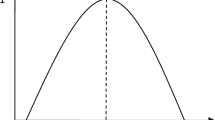Abstract
Job shop scheduling problem is well-investigated and widely applied in the fields of operational research, system engineering and automatic management. This paper employs uncertain programming to deal with the job shop scheduling problem with uncertain processing time and cost. First, a chance-constrained model is proposed under the framework of uncertainty theory. The model is equivalent to a crisp one by inverse uncertainty distribution method. Furthermore, three heuristic algorithms (genetic algorithm, particle swarm optimization, firefly algorithm) are employed for solving the model. Finally, a numerical example is solved by these three algorithms, and the results are analyzed to show which algorithm is better for solving the established model.

Similar content being viewed by others
References
Ashour S (1967) A decomposition approach for the machine scheduling problem. Int J Prod Res 6(2):109–122
Aphirak K, Sirikarn C, Thatchai T, Peeraya T, Warattapop C, Pupong P (2012) Application of firefly algorithm and its parameter setting for job shop scheduling. J Ind Technol 8(1):89–97
Bin Q, Ling W, De Xian H, Xiong W (2009) Multi-objective no-wait flow-shop scheduling with a memetic algorithm based on differential evolution. Soft Comput 13(8–9):847–869
Binchao C, Timothy I (2013) A flexible dispatching rule for minimizing tardiness in job shop scheduling. Int J Prod Econ 144(1):360–365
Boxma O, Forst F (1986) Minimizing the expected weighted number of tardy jobs in stochastic flow shops. Oper Res Lett 5(3):119–126
Conway R, Maxwell W, Miller L (1967) Theory of scheduling. Addison-Wesltey, Massachusetts
Ding C, Zhu Y (2014) Two empirical uncertain models for project scheduling problem. J Oper Res Soc. doi:10.1057/jors.2014.115
Ding S (2014) Uncertain minimum cost flow problem. Soft Comput 18(11):2201–2207
Fisher M (1976) A dual algorithm for the one-machine scheduling problem. Math Program 11(1):229–251
Gao Y (2012) Uncertain models for single facility location problems on networks. Appl Math Model 36(6):2592–2599
Gao Y, Yang L, Li S, Kar S (2015) On distribution function of the diameter in uncertain graph. Inf Sci 296:61–74
Graham R, Lawler E, Lensra J, Rinnooy K (1979) Optimization and approximation in deterministic sequencing and scheduling: a survey. Ann Discret Math 5(2):287–326
Hodegson T (1977) A note on single machine sequencing with random processing time. Manag Sci 23(10):1144–1146
Ishii H, Tada M, Masuda T (1992) Two scheduling problems with fuzzy due-dates. Fuzzy Sets Syst 46(3):339–347
Johnson S (1954) Optimal two and three-stage production schedules with setup times included. Nav Res Logist Q 1(1):61–68
Kennedy J, Eberhart R (1995) Particle swarm optimization. In: Proceedings of the 1995 IEEE international conference on neural networks, vol 4, 1942–1948
Kerem B (2011) A hybrid shifting bottleneck-tabu search heuristic for the job shop total weighted tardiness problem. Comput Oper Res 38(6):967–983
Miguel Á, Inés G, Camino R, Ramiro V (2012) An efficient hybrid evolutionary algorithm for scheduling with setup times and weighted tardiness minimization. Soft Comput 16(12):2097–2113
Lawler E (1973) Optimal sequencing of a single machine subject to precedence constraints. Manag Sci 19(5):544–546
Lei D (2007) Pareto archive particle swarm optimization for multi-objective fuzzy job shop scheduling problems. Int J Adv Manuf Technol 37(1):157C165
Liu B (2007) Uncertainty theory, 2nd edn. Springer-Verlag, Berlin
Liu B (2009) Theory and practice of uncertain programming, 2nd edn. Springer-Verlag, Berlin
Liu B (2010) Uncertainty theory: a branch of mathematics for modeling human uncertainty. Springer-Verlag, Berlin
Nabeshima I (1971) General scheduling algorithms with applications to parallel scheduling and multiprogramming scheduling. J Oper Res Soc Jpn 14(2):72–99
Prade H (1979) Using fuzzy set theory in a scheduling problem: a case study. Fuzzy Sets Syst 2(2):153–165
Peng J, Liu B (2004) Parallel machine scheduling models with fuzzy processing times. Inf Sci 1(4):49–66
Pinedo M (1983) Stochastic scheduling with release dates and due dates. Oper Res 31(3):559–572
Rui Z, Shiji S, Cheng W (2012) A two-stage hybrid particle swarm optimization algorithm for the stochastic job shop scheduling problem. Knowl-Based Syst 27:393–406
Sarin S, Erel E, Steiner C (1991) Sequencing jobs on a single machine with a common due date and stochastic processing times. Eur J Oper Res 51(2):188–198
Thiagarajan S, Rajendran C (2005) Scheduling in dynamic assembly job-shops to minimize the sum of weighted earliness, weighted tardiness and weighted flowtime of jobs. Comput Ind Eng 49(4):463–503
Yang X (2009) Firefly algorithms for multimodal optimization. Lect Notes Comput Sci 5972:169–178
Acknowledgments
This work is supported by the National Natural Science Foundation of China (No. 61273009).
Author information
Authors and Affiliations
Corresponding author
Additional information
Communicated by V. Loia.
Rights and permissions
About this article
Cite this article
Shen, J., Zhu, Y. Chance-constrained model for uncertain job shop scheduling problem. Soft Comput 20, 2383–2391 (2016). https://doi.org/10.1007/s00500-015-1647-z
Published:
Issue Date:
DOI: https://doi.org/10.1007/s00500-015-1647-z




